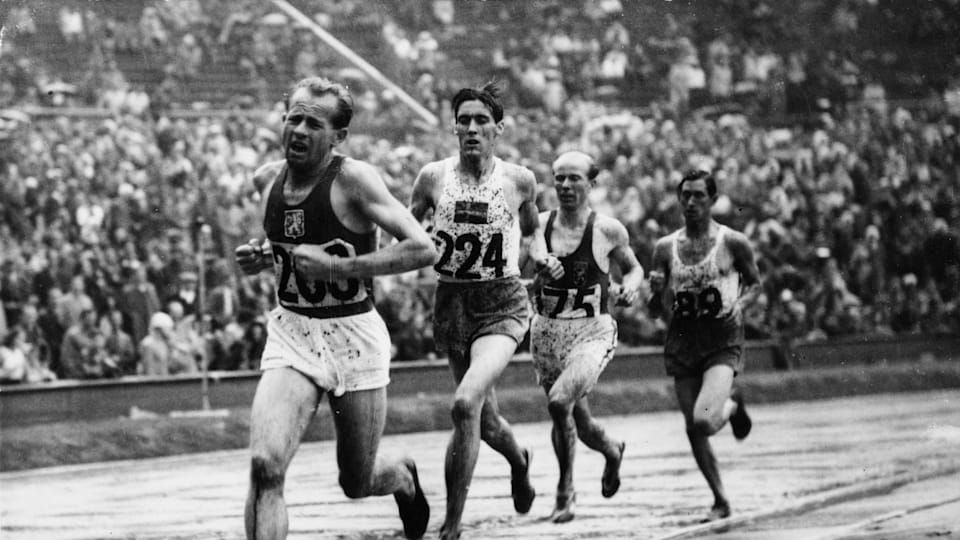Emil Zatopek: The eccentric brilliance of a long-distance genius
The Olympic Games are full of champions, records and stories, but they’re also an incredible encyclopaedia of strange, funny, emotional and sad moments. We’ll dig some out every week to put a smile on your face or a tear in your eye. This week: the legendary brilliance of Emil Zatopek.

The background
Heading into the Helsinki 1952 Olympic Games, Emil Zatopek was already considered one of athletics’ brightest stars. Back in London 1948, the Czechoslovakian runner had stunned the world by winning the 10,000m gold in an Olympic record time, having raced the distance for the first time ever only two months earlier. Legend has it that he lapped so many people that the timekeepers couldn't keep note of the competitors, and only registered the first 11 finishers.
Days later he added a 5,000m silver to his collection in an extraordinary comeback that saw him gain 100m on the eventual winner Gaston Reiff of Belgium before losing by a single metre. The Guardian described it as “a performance that would have made him one of the immortals of the track on its own”.
But while these victories may have shocked the world of athletics at the time, they were the result of a mind boggling training regime. Zatopek would run day and night in heavy army boots to prepare himself physically for races, hold his breath until he passed out and run on the spot for hours on end. At one point, Zatopek was putting in 100 flat-out 400m runs a day, in order to hone his body to deal with the rugged demands of international competition.
“It is better to train under bad conditions,” he explained, “for the difference is then a tremendous relief in a race."
The finals
By the time Helsinki 1952 came around, Zatopek was at his brilliant best. In the build-up to the Olympics he had won 69 races in a row, over various long distances. And while his preparations had at one point looked in doubt due to an infection that caused doctors to advise him against competing in the Games, Zatopek would not be denied his moment of history.
The first race he lined up in was the 10,000m, the title that he had won four years earlier. Once again, he trounced the competition, walking away with a gold medal. He followed up his win with another gold in the 5,000m, securing the long-distance double that he had missed out on in London by a stride's length.
But it was the next race that would see Zatopek’s name go down in history, as he achieved a feat that has never been replicated, before or since.
Zatopek decided to enter the marathon, having never run the distance before. Lining up against the world record holder and champion Jim Peters of Great Britain, he began the race as a clear underdog.
Approximately an hour into the race, Zatopek - who was famously talkative during his runs - turned to Peters and asked him whether he thought the pace was OK. Attempting to call his bluff, Peters told Zatopek that he felt the pace was in fact too slow.
But the ruse didn’t have the effect Peters had hoped it would. Upon hearing this news, Zatopek suddenly upped the pace and ran off into the distance putting two minutes between himself and the chasing pack. During the rest of the race, Zatopek - who spoke six languages - chatted jovially with a car full of photographers who were documenting the event. And by the time he finished in a new Olympic record and with an unprecedented third gold medal secured, he looked, as the Guardian reported “like a man who has had a brisk country walk.” It was a performance that one British journalist described as "the greatest happening in athletics history."
5,000m, 10,000m and marathon gold. Nobody has come close to achieving the treble again.
The outcome
Four years after his glorious triumphs in Helsinki, the long-distance king was once again training for an Olympics - Melbourne 1956. In typical Zatopek style, his training allegedly included running cross-country with his wife perched upon his back, a regime that caused him to develop a hernia. And when the Olympics did commence, the Czech maestro could only finish a disappointing sixth in the marathon.
A year after the Melbourne Games, Zatopek retired.
By early 1968, Czechoslovakia, which was under Soviet rule at the time, was in the midst of an uprising that came to be known as the Prague Spring. Zatopek had been a vocal supporter of the pro-democracy movement.
But when the Soviet forces quelled the uprising, Zatopek became a victim of his own beliefs, eventually being employed as a refuse collector before working in a uranium mine. He died in 2000 at the age of 78 with his mythical status set in stone and his Olympic triumphs having long-since become the stuff of legend.
Whether we will ever see the likes of Zatopek again is a difficult question to answer. But certainly, it is unlikely that the Czechoslovakian long-distance genius with an eccentric streak will ever be forgotten.
